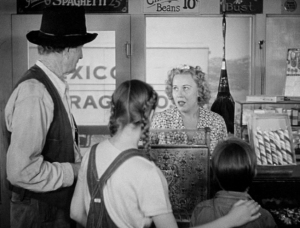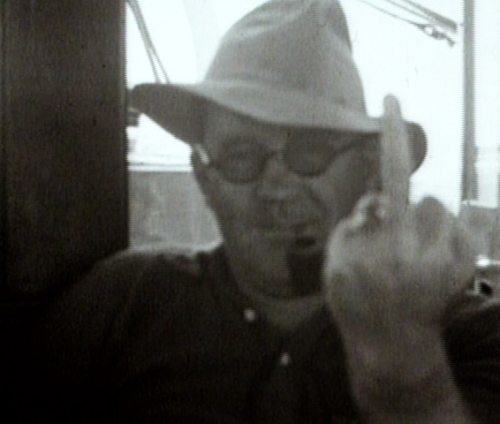The first edit that made me cry was about 50 minutes into John Ford’s The Grapes of Wrath (1940). (I’ve written at length about how much of a film wuss I am.) I had just returned from my first semester of my sophomore year in film school. The editing class had been a real eye-opener, and I had become incredibly sensitive to the Value of the Cut. In fact, my viewing of the film was like that cliché of the kid who returns from the war and can’t see anything the same way he used to. This was like that.
 The whole film was an epiphany (it was the first time I saw it and I hadn’t read the book), but this scene—when Pa Joad buys penny candy at a truck stop for his children–was when the scales tipped for me. It’s a typical Ford scene: wide or medium shots and very few edits. But somewhere in there, there’s an edit that’s perfectly timed. It isn’t much—nothing in the scene is terribly dramatic– but that edit is just enough to make sure we knew what every character was feeling. That one edit was all it took.
The whole film was an epiphany (it was the first time I saw it and I hadn’t read the book), but this scene—when Pa Joad buys penny candy at a truck stop for his children–was when the scales tipped for me. It’s a typical Ford scene: wide or medium shots and very few edits. But somewhere in there, there’s an edit that’s perfectly timed. It isn’t much—nothing in the scene is terribly dramatic– but that edit is just enough to make sure we knew what every character was feeling. That one edit was all it took.
Considering I have such strong feelings for Ford’s command of our attention, it’s only fitting that I wrap up ths series with a post about him. Previously, I’ve been explicit about why (I think) some filmmakers made the tasteful, retrained choices they did, reasons that include building tension, creating humor, and so on, but those are just specifics. The truth is that in every instance I described, the unspoken reason the director did what he did is because he knew exactly what he was doing. And Ford’s body of work is a feast of such examples, so many that it’s easier for me to just write about him in general terms.
 Of all the legends surrounding Ford (of which there are many), the most common is his claim to never shoot more than he deemed necessary, which in turn would limit the amount of tampering the studio could do after the film left his hands. Like many filmmakers of the studio system, he was given limited input in the editing 1 , yet Ford’s visualiztion of the finished film was so clear, he’d film the actors’ dialog only from the angles he wanted used.
Of all the legends surrounding Ford (of which there are many), the most common is his claim to never shoot more than he deemed necessary, which in turn would limit the amount of tampering the studio could do after the film left his hands. Like many filmmakers of the studio system, he was given limited input in the editing 1 , yet Ford’s visualiztion of the finished film was so clear, he’d film the actors’ dialog only from the angles he wanted used.
For example, if he didn’t want John Wayne’s line, “That’ll be the day,” to be seen in a close up, he wouldn’t shoot that line in a close up. The average director—certainly ones that play it safe—shoots all the dialog from multiple angles, giving the editor options while cutting the film. Ford knew if he didn’t give the editor options, then he’d exert control over the finished product—even if he was already knee-deep in shooting his next film. 2
Fortunately, I have a handful of clips that explain this. (Although his opinions on filmmaking have been chronicled in a handful of cranky on-camera interviews he did in the autumn of his years, we’re lucky enough to have some other sources for his pearls of wisdom.)
Editor and director Robert Parrish’s long career began when was an apprentice editor on Ford’s The Informer (1935). In a 1992 documentary about Ford, Parrish shared several first-hand accounts about the director. This anecdote is about how he was given the opportunity to cut a scene for The Grapes of Wrath…
What did Ford mean by “I don’t shoot anything I don’t want in the picture”? It sounds like a wrestler’s brag, a macho display of confidence. But here’s another anecdote from Parrish, this time explaining how Ford directed Victor McLaglen in The Informer (1935) and at the same time control what went into the camera…
That’s crazy. It takes a confident filmmaker to pull a stunt like that (although he had 22 years and 84 films under his belt when he directed that scene). And it’s certainly distracting to the actor (not that it hurt McLaglen any: he won the Best Actor Oscar for that performance).
But wait. There’s more. Here’s a scene from How Green Was My Valley (1941). 3 The set up: Because of the forbidden romance a young woman (Maureen O’Hara) has with a preacher (Walter Pidgeon), she marries another man. This is her wedding day, and as she stoically leaves the church, the heartbroken preacher watches from a distance. (This brief scene is followed by the audio commentary by Ford-biographer Joseph McBride. 4 )
And if that doesn’t sum up Ford’s attitude, then this last clip will. (In fact, it will sum up everything I’ve pushed in the all the essays in this series.) Robert Parrish once asked Ford how he directs actors, and this is what he said…
In other words, according to Ford, never make an edit unless you have a reason.
__________________________________________________
And that’s that. If I write anymore on this topic, I’ll only repeat myself. However, if you’d like a different take on the some of these ideas, check out this post by Steve Boone, over at Big Media Vandalism. His prose seems unchecked—I don’t mean sloppy, but he’s passionate and his ideas seem to fly out of his fingers.
I think we feel the same way about editing, but we discuss and dissect from opposites of the same coin. For example, in his post, he fearlessly criticizes contemporary filmmaking (with passing references to older films), whereas the seven essays I’ve written promote the films of yesteryear. (The youngest film I profiled is 22 years old!)
__________________________________________________
BACK TO POST 1 If the filmmaker’s films were successful, he’d be put on his next film ASAP. This is probably why Ford was able to do seven films between 1939 and 1941, an incredible run that included Stagecoach, Young Mr. Lincoln, The Grapes of Wrath and How Green Was My Valley.
BACK TO POST 2 This subversive technique didn’t always work for him, at least by the studio’s definition of “working,” and the most famous example of it will be the topic for a later post.
BACK TO POST 3 I think How Green Was My Valley rocks. For decades I’ve heard this film referred to derisively as “The Film That Beat Citizen Kane for Best Picture.” That massive simplification of this film kept me at an arm’s length from it, and I finally saw it a few years ago. What a boob I was for buying into the Kane Propaganda Machine.
BACK TO POST 4 For those who care, yes, it’s the same Joseph McBride who co-wrote the Corman-produced Rock ‘N’ Roll High School.


